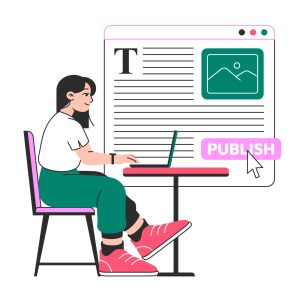Proofreading for non-native academic authors
At Rosetta Translation we regularly receive requests to proof academic papers or research material. Most of these requests are from researchers whose work is written in English, yet they are not native speakers of English. Proofreading academic texts can dramatically increase their acceptance for publication. It can also make sure the material is as intelligible as possible, and so ready to publish online.

Proofreading research or scholarly papers is a specialised task requiring more than just a good eye for language use. This requires adjusting text to fit the rigors of academic requirements, while preserving original intent and tone. Research papers are filled with complicated concepts, technical language and formatting, making proofreading perhaps the most critical last step. This post discusses important things to keep in mind when proofreading academic texts from the perspective of linguistics and provides useful tips to help achieve this goal.
Understanding the purpose of proofreading academic papers
The proofreading in the academic research serves multiple purposes such as:
Ensuring Quality: The text has to be devoid of any grammatical, spelling and punctuation errors. In academic writing, accuracy is essential, and even small errors can destroy trustworthiness.
Avoiding Lack of Clarity and Readability: Clear and concise presentation of ideas is the essence of a research paper. From this perspective, proofreading helps language to be accessible while maintaining the complexity of the content.
Avoiding Slang: Slang or informal language are never to be used in academic writing. They assist with detecting or resolving informal phrases and tone issues via proofreading.
Following Formatting Rules: Academic papers typically must adhere to particular style guides (e.g., APA, MLA or the Chicago Style Guide). A proofreader has to make sure that the text follows these guidelines, be it citations, references, and overall layout.
What is Special about Proofreading Academic Papers?
Linguists proofreading academic papers face some specific challenges:

Field-specific Terminology: Research articles often employ terminology used for technical concepts in a field. Proofreaders must ensure that these terms are accurately translated and consistently used throughout the document.
Long, Dense Sentences: Academic writing tends to be compounded in long, complex sentences. Linguists need to check that such structures are not only grammatical but also get the intended meaning across.
Cultural Nuances: Cultural differences might influence the understanding of the text, especially if it relates to fields such as social sciences or humanities.
Target Audience Adaptation: Academic papers can be written for an international audience or a specific field. For example, as you proofread your content, ensure language and presentation is appropriate for the target audience.
General Tips for Proofreading of Academic Papers
1. Terminological Consistency
The linguists need to make sure that both technical terms, abbreviations and key words are uniform throughout the text. It is particularly relevant in the case of multi-author papers where the terminology might differ between authors. Glossaries, termbases or CAT tools are useful to ensure consistency. Alternatively, consulting with the author or subject-matter expert on what terms are preferable can help resolve ambiguities and ensure accuracy. This is important for any writing, but can be especially crucial for medical papers, where using the proper names of conditions, procedures or treatments can help other medical professionals avoid misinterpretations and misconceptions, and where mistakes could literally kill.
2. Attention to Style Guides
Academic institutions and publishers usually require certain style guides to be used when writing, such as APA, MLA, or Chicago. Proofreaders should also already know these rules to make sure all citations, references, and headings are compliant. In addition, those guides frequently prescribe formatting specifics, like the location of tables and the organization of abstracts. Thus, it is imperative to stay updated with the latest version of these style guides as the formatting rules can change over the years.
3. Cross-Referencing of Citations and References
One of the most common issues in academic texts are mismatched citation and references. Proofreaders must also rigorously check each in-text citation against the reference list to ensure that all entries have been included and formatted correctly. It is also crucial to avoid errors when double-checking numerical references, as sometimes seen in scientific and engineering papers.
4. Logical Flow and Coherence
Proofreading comes down to much more than just fixing grammar; it involves sober evaluation of the logical flow of ideas. Check that transitions from section to section are fluid and that arguments are logically structured. When there are a number of writers, certain portions may feel discontinuous or fragmented due to differences in writing style. It is a useful skill to rework parts like these for readability without losing the gist of what they are trying to say.
5. Avoiding Over-Editing
Linguists have to walk a tightrope between clarity and the author’s voice. Academic authors often have a distinct writing style that reflects their discipline and cultural background. Editing too much can also accidentally sanitise the text. It is better to flag significant issues for the author to review rather than making drastic changes without consultation.
6. Examining Facts and Checking for Accuracy
Proofreaders are obviously not responsible for checking the validity of the research itself, but they should be alert to discrepancies in presentation of data or terminology. The paper’s integrity can be undermined, for instance, by inconsistent units of measurement, mismatched figure captions or wrong symbols. It is always good practice to work with the author to clarify such points.
7. Processing Figures, Tables, and Appendices
Figures and tables are usually neglected during proofreading even though most of the times they are major parts of any academic article. Proofreaders should also make sure labels, titles, and notes are rendered correctly and formatted uniformly.
9 Adapting style for Authors Whose Native Language is Not English
A great number of academic papers are written by authors for whom English is a second language. Proofreaders should be sensitive to linguistic nuances and cultural influences that may inform the text. As to enhancing conciseness for an international readership, this may be achieved by simplifying overly complex sentence structures while avoiding overly idiomatic expressions altogether.
Guidelines for proofreading effectively
Use Tools Wisely: Make use of proofreading software such as Grammarly, but don’t solely depend on that. These tools may not recognise domain-specific terminology or complex sentence structures.
Read Aloud: Reading the text aloud can reveal awkward phrasing or parts where the flow is broken.
Double-Check Formatting: Ensure format is followed properly, with particular regard to headings, sub-headings and lists. Ensure consistency in font sizes, spacing, and alignment.
Communicate with the Author: Don’t be afraid to ask the author about specific terms, ideas or formatting preferences. Working together with the author ensures that the final product is actually accurate and aligns with what the author intended.
Mistakes You Should Avoid When Proofreading an Academic Paper
1. Ignoring Small Errors: Minor issues like inconsistent capitalization or punctuation will make the paper less professional. Make sure you find and fix these mistakes.
2. Neglecting the Context: You should always pay attention to the broader context of the paper.
3. Rushing the process: Academic proofreading takes time and thoroughness. Do take your time to read through the text carefully.
4. Not Adapting to the Discipline: Different academic disciplines have their own conventions. Get to know a field’s specific requirements and its norms.
Conclusion
The process of proofreading research and academic papers can be tedious and daunting. It requires a fine-grained sense of what is academically appropriate, culturally sensitive, and relevant to the topic at hand. Academic proofreaders are skilled in the specialised vocabulary and conventions practiced in scientific literature and will pay attention to terminology, style, formatting, etc., which together ensure that the final document is not only flawless but also a refined and professional representation of the author’s ideas. Academics would be wise to enlist the services of a competent linguist who specialises in proofreading; this investment can greatly improve the quality and reach of their research.
About the Author
Eric Fixmer
Eric is the Managing Director and founder of Rosetta Translation. Originally from Luxembourg, he holds a PhD in phonetics from Cambridge University and he started Rosetta in 2004, leading the company from his living room to being a leading international provider of language services with offices in Europe, Asia and America… Read Full Bio








